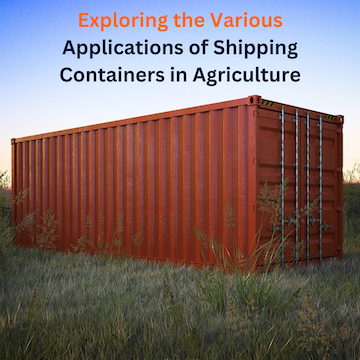In recent years, the agricultural industry has witnessed a significant transformation in the way farmers and businesses operate. As the need for efficient and sustainable farming practices continues to grow, innovative solutions are emerging to address these challenges. One such solution gaining popularity is the use of shipping containers in agriculture. These versatile and adaptable structures offer numerous applications that revolutionize the way we cultivate crops, store produce, and address logistical challenges. In this blog post, we will delve into the various applications of shipping containers in agriculture and explore their benefits for farmers and businesses.

Vertical Farming:
Shipping containers provide an ideal environment for vertical farming, a practice that involves growing crops in stacked layers. With limited arable land and an increasing demand for fresh produce, vertical farming presents an innovative solution. Shipping containers can be transformed into fully controlled indoor environments with customized lighting, temperature, and humidity controls. This allows farmers to grow crops year-round, regardless of external climate conditions, resulting in increased productivity and reduced water usage.


Mobile Farms:
The mobility of shipping containers makes them perfect for mobile farming operations. By retrofitting containers with hydroponic or aquaponic systems, farmers can create self-contained mobile farms that can be transported to different locations as needed. This flexibility enables farmers to optimize crop production, adapt to market demands, and explore new markets without the need for significant infrastructure investments.
Seedling Nurseries:
Shipping containers can serve as efficient seedling nurseries, providing an optimal environment for young plants to thrive. With carefully controlled conditions such as temperature, humidity, and lighting, containers offer a protected space for germination and early growth. This approach allows farmers to produce high-quality seedlings that can later be transplanted into the field, leading to improved crop yield and uniformity.
Crop Storage and Preservation:
Proper storage and preservation of crops are vital to ensure their longevity and maintain their quality. Shipping containers can be modified to create cold storage units, where temperature and humidity can be regulated to preserve harvested produce. By utilizing containers for crop storage, farmers can reduce post-harvest losses, extend the shelf life of perishable goods, and minimize the need for chemical preservatives. This is particularly beneficial in remote or underserved areas where traditional storage infrastructure is limited.
Farm-to-Table Markets:
The growing demand for locally sourced produce has led to the rise of farm-to-table markets. Shipping containers can be transformed into modular marketplaces, serving as on-site retail spaces for farmers to sell their products directly to consumers. These containers can be equipped with refrigeration units, display shelves, and even cooking facilities, providing a complete farm-to-table experience. Such setups help farmers establish a direct connection with customers, increase their profitability, and reduce the carbon footprint associated with traditional supply chains.


Water Collection and Irrigation:
Water scarcity is a significant concern in many agricultural regions. Shipping containers can be utilized to collect and store rainwater, providing a sustainable water source for irrigation purposes. By integrating water collection systems with container-based farms, farmers can minimize their reliance on traditional water sources, reduce costs, and contribute to water conservation efforts.


ROYSE CITY WEATHER


